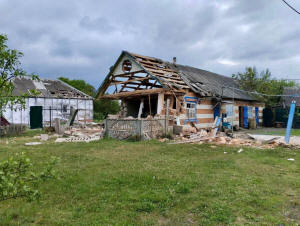Ukraine war: Belgorod incursion may stretch Russia's defenses
 Send a link to a friend
Send a link to a friend
 [May 24, 2023]
By Tom Balmforth, Anna Dabrowska [May 24, 2023]
By Tom Balmforth, Anna Dabrowska
LONDON/KYIV (Reuters) -A two-day incursion from Ukraine into Russia's
western borderlands could force the Kremlin to divert troops from front
lines as Kyiv prepares a major counteroffensive, and deal Moscow a
psychological blow, according to military analysts.
Though Kyiv has denied any role, the biggest cross-border raid from
Ukraine since Russia invaded 15 months ago was almost certainly
coordinated with Ukraine's armed forces as it prepares to attempt to
recapture territory, the experts added.
"The Ukrainians are trying to pull the Russians in different directions
to open up gaps. The Russians are forced to send reinforcements," said
Neil Melvin, an analyst at the Royal United Services Institute (RUSI).
Ukraine says it plans to conduct a major counteroffensive to seize back
occupied territory, but Russia has built sprawling fortifications in its
neighbour's east and south in readiness.
The incursion took place far from the epicentre of fighting in Ukraine's
eastern Donbas region and around 100 miles (160 km) from the front lines
in the northern Kharkiv region.
"They'll have to respond to this and put troops there and then have lots
of troops all along the border area, even though that may not be the way
the Ukrainians are coming," Melvin said.

Russia's military said on Tuesday it had routed militants who attacked
its western Belgorod region with armoured vehicles the previous day,
killing more than 70 "Ukrainian nationalists" and pushing the remainder
back into Ukraine.
Kyiv has said the attack was carried out by Russian citizens, casting it
as homegrown, internal Russian strife. Two groups operating in Ukraine -
the Russian Volunteer Corps (RVC) and Freedom of Russia Legion - have
claimed responsibility.
The groups were set up during Russia's full-scale invasion and attracted
Russian volunteer fighters wanting to fight against their own country
alongside Ukraine and topple President Vladimir Putin.
Mark Galeotti, head of the London-based Mayak Intelligence consultancy
and author of several books on the Russian military, said the two groups
comprised anti-Kremlin Russians ranging from liberals and anarchists to
neo-Nazis.
"They're hoping that in some small way they can contribute to the
downfall of the Putin regime. But at the same time, we have to realise
that these are not independent forces ... They are controlled by
Ukrainian military intelligence," he said.
Ukrainian presidential aide Mykhailo Podolyak repeated Kyiv's position
that it had nothing to do with the operation.
The United States says it does not "enable or encourage" Ukrainian
attacks on Russian territory, but that it is up to Kyiv to decide how it
conducts military operations.

Several similar incursions into Russia have occurred in recent months,
and although this week's was the largest known so far, it is still tiny
when compared to frontline battles.
[to top of second column]
|

A view shows damaged buildings, after
anti-terrorism measures introduced for the reason of a cross-border
incursion from Ukraine were lifted, in what was said to be a
settlement in the Belgorod region, in this handout image released
May 23, 2023. Governor of Russia's Belgorod Region Vyacheslav
Gladkov via Telegram/Handout via REUTERS

ECHOES OF 2014?
Alexei Baranovsky, a spokesperson for the political wing of the
Freedom of Russia Legion, told Reuters in Kyiv that he could not
disclose the number of troops involved in the operation, but that
the legion had four battalions in total.
Baranovsky denied there had been heavy losses, and he dismissed
Russian reports of large casualties as disinformation.
He said the unit was part of Ukraine's International Legion and
therefore part of its armed forces, but denied the incursion was
coordinated with Ukrainian authorities.
"These are the first steps in the main objective of overthrowing
Putin's regime through armed force. There are no other
alternatives," he said.
Galeotti said the incursion looked like a Ukrainian battlefield
"shaping" operation ahead of Kyiv's planned counteroffensive.
"... This is really a chance to do two things. One is to rattle the
Russians, make them worried about the possibility of risings amongst
their own people. But secondly, force the Russians to disperse their
troops," he said.
Melvin noted that the operation also served to boost morale in
Ukraine.
Kyiv officials have mimicked the Kremlin's rhetoric surrounding
Russia's annexation of Crimea in 2014 when it initially denied the
troops involved were Russian.
Podolyak blamed the Belgorod incursion on "underground guerrilla
groups" comprising Russian citizens and said: "As you know, tanks
are sold at any Russian military store."

The remark appeared to echo Putin's response in 2014 when asked
about the presence of men wearing Russian military uniforms without
insignia in Crimea: "You can go to a store and buy any kind of
uniform."
On social media, Ukrainians made reference to what they called the
"Belgorod People's Republic" - a nod to events in eastern Ukraine in
2014, when Russia-backed militias declared "people's republics" in
Ukraine's Donetsk and Luhansk regions.
Ukrainians also circulated a video of President Volodymyr Zelenskiy
delivering his famous "I am here" video address from Kyiv at the
beginning of the invasion in February 2022. But instead of the
presidential office in Kyiv, the background showed the welcome sign
to the city of Belgorod.
(Additional reporting by Max Hunder in Kyiv and Agnieszka
Pikulicka-Wilczewska in Warsaw; editing by Mike Collett-White and
Mark Heinrich)
[© 2023 Thomson Reuters. All rights
reserved.]This material may not be published,
broadcast, rewritten or redistributed.
Thompson Reuters is solely responsible for this content. |